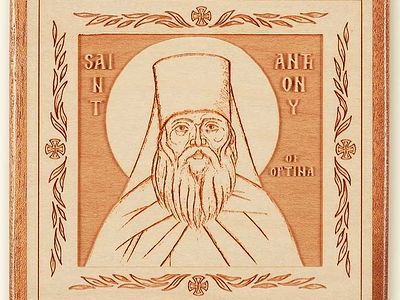The following teachings of St. Macarius of Optina were taken from Living Without Hypocrisy: Spiritual Counsels of the Holy Elders of Optina, Holy Trinity Publications, 2005:
KNOWLEDGE OF GOD
If we truly labor to cleanse our hearts from the passions, then according to the amount that we have purified ourselves, Divine Grace will open our eyes spiritually to the vision of the true Light; for as it is written, blessed are the pure in heart, for they shall see God (Matt. 5:8). This is achieved only through humility, for it is in humility that divine mysteries are revealed.
SICKNESS
We are visited by sicknesses and sorrows. This is an indication of God's mercy towards us, For whom the Lord loveth, He chasteneth, and scourgeth every son whom He receiveth (Heb. 12:6), and so it is proper for us to thank the Lord for His fatherly Providence for us. Sorrows instruct us and make us skillful in our work, and likewise they, along with sickness, cleanse us of sins.
We do not know the judgements of God, but He does everything for our benefit. We are bound to earthly blessings, but He desires to give us future blessings through brief sicknesses on this earth.
SPIRITUAL WELFARE
Our life is a spiritual warfare with unseen evil spirits. They arouse us through our weaknesses and passions; they urge us to disobey the commandments of God. When we look with discernment, we will find that for every passion there is a cure, an opposing commandment; therefore, do the enemies of mankind try to keep us from this saving cure.
The struggle to not have possessions is indispensable; for the darkness and gloom of this passion obscures our spiritual vision, so that we cannot see the sun of righteousness, Jesus.
The struggle against the passions, the warfare with them and invisible enemies, is relentless, terrible, and ferocious. It is humility that defeats them.
SPIRITUAL UNDERSTANDING

Begin gradually, do not trust yourself, do not depend on your own understanding, reject your own will, and the Lord will give you true understanding.
Unfortunately, everywhere now they talk and write so freely about religion, not constructively, but to cast doubts. Sensuality has seized control and the younger generation is more inclined to freedom and not bridling the senses, and they give their thinking free rein, even though it is darkened.
With humility the mind is pleasing to God, but with pride it is rejected.
DISCERNMENT
True understanding, or discernment, is obtained through humility, and humility through sorrows. According to St. Peter Damascene, he who flees from sorrows flees from his own salvation.
COMPLAINING
God endures all the sins of man, but He does not leave a complainer without punishment.
Watch out for complaining and faintheartedness, which worsen and increase sorrows.
GUIDANCE
Humility is born from true obedience and the rejection of self-centered thoughts, when we do not trust ourselves in any way, and cutting off our will and understanding, we entrust them to others who are able to guide us.
Not having anyone to nourish or guide your soul, you must instead read books and be nourished by them, while imploring God's help.
CONCEIT
Conceit—that subtle arrow of the devil—secretly wounds the heart and its seed is subtly planted, so that little by little it grows into a pharisee, and later it succumbs to complete pride—but this is the demonic realm.
Watch carefully so that the thieving thought does not creep in, which says that you live better and more attentively than others. It is so dangerous that you will not even notice how, from a poppy seed falling on the heart, it will grow into a giant pharisee, turn into complete arrogance and more. Before the Lord it is better to be a sinner with repentance than a righteous person with pride.
Do not consider every proud suggestion and opinion about yourself to be a minor sin, but prostrate yourself before God, and ask for forgiveness and help in being delivered from it.
If you were not subject to temptation and not recognizing your infirmities, and you saw only your own improvements and placed your hope of salvation on them, then you could fall into extreme haughtiness and incurable deception; for when the enemy cannot conquer someone through passions and infirmities, then he places into the mind haughtiness and conceit, from which they fall into deception and the darkening of the mind.
Beware of having exalted thoughts about yourself. For this the grace of God withdraws its help and we are handed over to the passions and (evil) spirits as punishment.
Through obedience humility is achieved, we recognize our worth and we flee from conceit.
SELF-KNOWLEDGE
We cannot know ourselves other than through association with our neighbors, receiving from them reproaches and vexation, as a cure for our spiritual wounds, while reproaching ourselves for impatience, but not them; instead we must thank them, for through them we came to know our spiritual infirmity, by God's Providence. And having serenity, by God's grace, be careful not to be carried away with a high opinion of yourself, so that you again do not suffer: the enemies do not sleep, they only fear humility.
SELF-REPROACH
Strive in every way to acquire self-reproach and humility, and be attentive and watch over the movements of your heart.
Watchfulness over yourself and self-reproach at all times produce humility, and that preserves peace.
If we happen to be reproached or scorned by someone, we must instruct our heart to say: "We're worse than they are,"—not only with the tongue but with a heartfelt pledge.
No matter who he might be, always consider him to be better than you, and as you gradually get used to this you will regard everyone as an angel, and you yourself will be at peace. But as long as your self-loving part is not subdued, much fire will be required to burn it up.
THE HEART
Follow the movement of your heart and vanquish those passions which arise, but mainly pride, anger, wrath, judgement, and condemnation of your neighbors. How can we weep for other deceased people when our corpse lies before us—our soul deadened by sins.
SORROWS
It is impossible to pass your entire life without temptations and sorrows, and to always be happy and without a care. Know that God is caring for you when He sends sorrows and griefs, and with them He tries to instruct you and make you more wise in spiritual understanding. Without sorrows we cannot be humble or acquire spiritual understanding. And be assured that without God's permission, no kind of sorrow can come to us. Although it may seem that people are the cause of them, they are the instruments by which God acts in the work of our salvation.
If God sends someone sorrows, it is in order to cleanse him of sins and prepare him for the eternal Kingdom of Heaven. Here everything is temporal, but there it is eternal.
You will never flee from sorrows for they are a product of your own passions, for exposing them, so that, with God's help, we might take care to heal them.
Woe to our times: we now depart from the narrow and sorrowful path leading to eternal life and we seek a happy and peaceful path. But the merciful Lord leads many people from this path, against their will, and places them on the sorrowful one. Through unwanted sorrows and illnesses we draw closer to the Lord, for they humble us by constraint, and humility, when we acquire it, can save us even without works, according to St. Isaac the Syrian.
TENDING THE SICK
Tending the sick is one of the most powerful means of preserving purity.
THOUGHTS
The thoughts that vex and annoy us have many distinctions: a provocation, or an attack of a thought, is not a sin but is a test of our free will, to what it is inclined—to the thought or to opposition of it. However, when there is agreement and communion with these passions it is considered to be a sin and repentance is needed. He who does not have the strength to oppose them himself must hasten to God, cast down his infirmity and implore His help and the help of the Mother of God. When someone is conquered by thoughts, it is a sign that pride preceded them, and therefore he must humble himself more.
Do not be surprised that various thoughts arise during the time of the services: when you take up arms against the enemies, i.e., prayer, then they arm themselves against you more forcefully with provocative thoughts. Flee to the Lord with prayer against them and do not become confused: they will vanish. When you become confused, seeing that they do not leave you, they arm themselves even more against you; but when you chant unto God with humility, then you will be at peace.
The holy fathers in general consider blasphemous thoughts to be not our thoughts but provocations of the enemy; and when we do not agree with them but grieve that they have penetrated our mind, then this is a sign that we are not guilty of them. One should not be disturbed that they come. When a person becomes disturbed, the enemy attacks him even more, but when he pays no attention, disregards them and does not consider them to be a sin, then the thoughts vanish.
Obedience is what directs us on the path of perfection.
FASTING
While refraining from food, one must also refrain from the passions.
PRAISE
Whoever reproaches us, gives us a gift, but whoever praises us, steals from us. St. Ambrose
How harmful is the praise of man! Even though a person may have done something worthy of praise, when he enjoys the sound of praise he is already deprived of future glory, according to the teachings of the holy fathers.
To have a high opinion of oneself is a serious sin before God; but people afflicted with this not only do not repent of it, but they do not even consider it a sin. Нее from this evil root!
We must fear every kind of praise and glory from men, for according to the teachings of the holy fathers, "it is not only the one who accepts praise from men, but even the one who hears the sounds of the words with enjoyment, that is deprived of eternal glory." Lord, do not allow us to be carried away by the enjoyment of the vain glory of this world!

God cares and provides for us more than we ourselves. He arranges our salvation, but He also does not want us to seek it in worldly enjoyment, but in sorrows, difficulties, and sicknesses. Was it not with infirmity that our fathers and mothers entered the Kingdom of Heaven? Did they not reach it by the narrow and sorrowful path? They sorrowed, but they did not grow weary and become despondent and this served as a comfort for them during the most cruel sorrows, spiritual and physical. Through enduring them with perfect humility they received absolute peace and even spiritual gifts.
The works of God are wondrous and unfathomable for our darkened minds, but as much as possible, we see from Scripture and our personal experiences that the Lord sends sicknesses, sorrows, deprivation, droughts, wars, and revolutions, either as punishment for our sins, or in anticipation, so that we do not fall into sins, or sometimes to test our faith. And so, we must bow in reverence before His all-wise Providence and give thanks for His ineffable mercy towards us.
How would we know ourselves if no one caused us sorrow, and how would we acquire patience, and how would we be humbled? All of this does not happen without Divine Providence, but by His most wise supervision, each person is presented, for testing his will and patience, situations which can disturb and shake him, so that he can see his infirmity and be humbled, or so that he can acquire the virtues of patience and love.
We do not know the judgements of God. He does everything for good. We are bound to earthly blessings, but He wants to give us future blessings through brief earthly sickness.
His all-embracing Providence extends over the whole world, but especially over each of us.
THE PATH TO SALVATION
Do not get lost in sorrow, do not seek lofty gifts, but conduct yourself with humility: feel compunction upon your beds for what ye say in your hearts (Ps. 4:5). Reproach yourself for your imperfections; this is better than your lofty improvements accompanied by conceit. As long as we remain in this war, we must neither be bold nor despair.
IRRATIBILITY
Irritability, or the anger part of our tripartite soul, is not given in order to be angry at our neighbors, but in order to have zeal against sin. When we become enraged with our neighbors, we do this contrary to our nature. Irritability is strong in us because of pride.
Irritability shows us our inner disposition which we must overcome with self-reproach, patience, love, not noticing the weaknesses of our neighbors and not condemning others. Sometimes, however, we are offended, and this, of course, is not without Divine Providence, in order to show us our infirmity and give the means for healing: struggle, resistance, and humility.
To fight against irritation we have patience, self-reproach, and contemplation of the sufferings of Christ.





